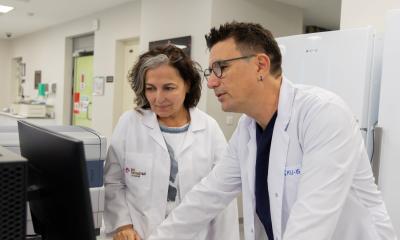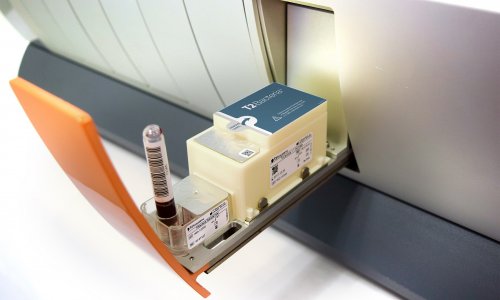Antimicrobial stewardship
A diagnostic marker reduces antibiotics use
Since 2009, as part of diagnostic and antimicrobial stewardship strategies, Hampshire Hospitals National Health Service (NHS) Trust has used serum procalcitonin (PCT) – an innovative and highly specific marker to diagnose clinically relevant bacterial infections and sepsis.
Report: Mark Nicholls

Consultant Clinical Microbiologist and the Director of Infection Prevention and Control, Dr Kordo Saeed, explained: ‘In our experience, the integration of the PCT assay to our clinical practice, has not only led to safe reduction in unnecessary antibiotic usage and costs in our Trust, but has also potentially resulted in reduction of selective pressure on antibiotics and on hospital beds.’
In early June, Dr Saeed outlined his hospital’s success in ‘rapid procalcitonin assay in diagnosis and monitoring of sepsis’ during the national meeting of the Association for Clinical Chemistry and Laboratory Medicine in Cardiff, Wales. There he examined the ‘potential impact and the usefulness of a rapid “quantitative” point of care (POCT) testing’ in the context of reconfigurations and mergers of diagnostic laboratories.
Procalcitonin has been around since mid-1980s and is interests clinicians because it appears to be more specific for bacterial infection, particularly when there are systemic features or sepsis. This has proved advantageous because it enables clinicians and hospitals to make more informed decisions on treatment, particularly when clinical presentations of some viral infections, inflammatory conditions and bacterial infections can be similar, making a clinical diagnosis and appropriate treatment of infection challenging.
‘Additionally,’ Dr Saeed said, ‘clinical signs and laboratory findings may be subtle in the early stages of infection. There is a tendency among many clinicians to treat for potential infection if they have doubts, just in case the cause is infective. This in turn leads to inappropriate antibiotic use and higher costs.’ PCT also has other advantages because, apart from being more specific for bacterial infections than other biomarkers, it is quicker, stable and relatively easy to measure. ‘Anything that can complement our clinical findings in a timely manner and support differentiating bacterial infection from non-infection can help to improve not only patient management, but also the appropriate use of antibiotics. In this context and in our experience PCT appears to be an effective marker,’ he said.
Research published by Dr Saeed and colleagues has suggested that in about 50% of those ‘just in case’ cases, PCT has resulted in either withholding and/or stopping antibiotics without adverse effect in those patients, whilst continuing antibiotics in cases of patients who need antibiotics. ‘Overall by introducing PCT, there were around 17% reductions in antibiotic use and, based on British National Formulary prices, this has resulted in direct savings in antibiotic usage of around £14,450 (€20,000) for every six months,’ he added. There are additional savings from hidden costs associated with giving antibiotics such as IV sets, pharmacy time, nursing time and storage. PCT has helped the clinicians to make clearer decisions on giving antibiotics to patients who need them, but also preventing patients unnecessarily receiving antibiotics or suffering adverse effects of antibiotics.
In the case of sepsis, PCT has been a major benefit
Dr Saeed concluded: ‘Diagnosis of Sepsis can be challenging and we need biomarkers that can assist doctors to diagnose sepsis in a timely manner in order to achieve the best outcome for patients. Real life evaluations of the newer and more rapid point of care PCT test in Emergency Departments, General Practice and/or inside ambulances may provide us with additional armaments to achieve this.
However, he stressed procalcitonin is NOT a magic bullet and, like other clinical tests, PCT results must not be acted upon as an individual marker or without considering full history, physical exam and other investigational findings. ‘It is,’ he said, ‘part of a jigsaw and can be used to complement clinical judgments and physical examinations.’
PROFILE:
Kordo Saeed is Consultant Clinical Microbiologist and the Director of Infection Prevention and Control at Hampshire Hospitals NHS Foundation Trust and also an Honorary Senior Lecturer Southampton University Medical School. His specific areas of interest are clinical microbiology and infection prevention; biomarkers and antimicrobial stewardship; management of orthopaedic-related infections; education, research and clinical evaluations; and health promotion and education in developing countries.
19.06.2015





